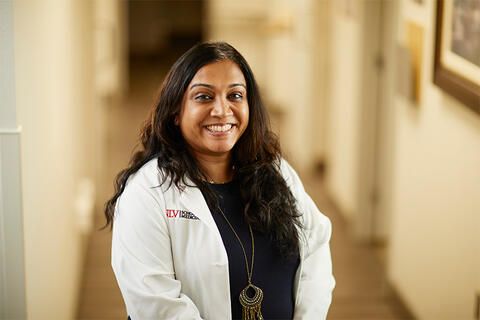Overview
We welcome you to learn more about the most established internal medicine training program in Las Vegas, Nevada. The former University of Nevada, Reno School of Medicine Las Vegas Internal Medicine Residency Program started in 1979. The training program is highly successful in developing proficient physicians who embrace their role and the duty to put their patients first. The medium size of our program fosters a supportive learning environment with frequent direct interaction with faculty. Collegiality amongst the residents, fellows, and faculty is one of our major strengths. Our residents have the opportunity to work directly under the supervision of our fellows in cardiology, critical care medicine, endocrinology, gastroenterology, geriatrics, and pulmonary critical care medicine.
Training in the state-of-the-art simulation center enhances the resident experience by practicing procedures and participating in simulated codes using a high-fidelity simulator. We also incorporate the use of standardized patients to advance communication skills.
We were accredited for 10 years by the Accreditation Council for Graduate Medical Education (ACGME) at our most recent site visit.
Las Vegas is truly a fabulous city with more depth than one imagines based on first impressions. In addition to robust dining and its status as an entertainment capital, residents are able to enjoy the great outdoors in a growing medical environment. Read more about living in Las Vegas.
Private call rooms are provided for interns and residents when on night admit shifts. There are additional sleep rooms available for residents any time they are feeling too fatigued to work or drive home.
Curriculum
The residency program has a multimodal approach to learning, including both hands-on and self-directed approaches. We have set resident conferences with our core didactics and interactive case-based noon reports. Additionally, teaching occurs in all clinical services. We incorporate online modules to supplement and aid further learning.
Resident Conferences and Learning Opportunities
Conferences include noon reports, weekly intern noon reports, and weekly academic half-days every Tuesday. A board review series is incorporated into the conference series. The Veterans Administration (VA) Southern Nevada Healthcare System also conducts a daily noon conference, except on Tuesdays when they participate in the academic half-day via video. The residency program aims to promote self-directed learning with the use of learning communities and asynchronous learning opportunities. These include the internal medicine curriculum from the John Hopkins Physician Education and Assessment Center, Butterfly Academy’s Education Point of Care Ultrasound modules, and an ambulatory curriculum that utilizes a disease of the month series.
Simulation
Our residents have multiple opportunities for experiences in our state-of-the-art Clinical Simulation (SIM) Center of Las Vegas:
